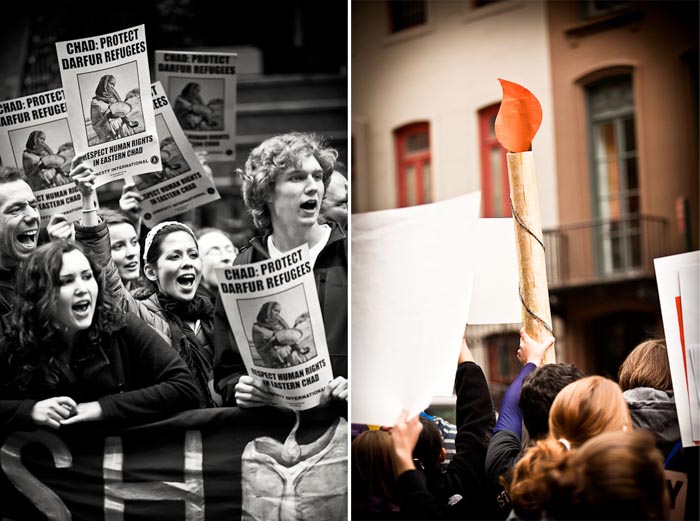At last night's Group 133 meeting a Group 133 member and GOTB coordinator gave a presentation detailing the GOTB 2011 Sri Lanka action, including the actions "asks," the current situation in Sri Lanka and background and history regarding the 30 year civil war.
Some History:
Sri Lanka is an island nation off the southeastern coast of India. The island was occupied for some 2,000 years by the neighboring Sinhalese and Tamil kingdoms, but like many of the island's neighbors, Sri Lanka (or Ceylon, as it was then known), eventually came under the influence of European colonial powers. The Portuguese arrived in the early 1500s, then the Dutch in the 17th Century, and eventually the British annexed the territory in the 1800s. After World War II, during the decline of colonialism, Sri Lanka gained independence in 1948, however, the island which had traditionally been ruled by separate kingdoms, was now under one government, the majority of which was Sinhalese.
Independence:
A pattern of Sinhalese discrimination against the Tamil majority began early in the newly independent nation. In 1949, Sinhalese began colonization of Tamil territories in the north and east of the island, in 1956, the government named Sinhalese
the sole, official language of the country. In 1970, the government began a policy of "ethnic standardization," severely limiting access to higher education for Tamil students. By this time, peaceful protests and demonstrations of Tamil people were met with violence by the government. During the 1970s and 80s, Tamil militant groups began forming, most notably, the Liberation Tigers of Tamil Eelam (LTTE) or "Tamil Tigers." While the Tamil Tigers primarily targeted Sinhalese military targets, they also conducted targeted political killings, even killing Tamil government officials or academics they considered to be "traitors" to the Tamil cause.
Civil War:
Between 1983 and 2009, the Tamil Tigers and the Sri Lankan government battled while civilians were often caught in the crossfire. Both sides are accused of committed war crimes, particularly during the final stages of the war in 2009. These include the use of child soldiers and attacks on civilians by the Tamil Tigers, and extra-judicial executions, carpet bombing and indiscriminate massacres of civilians and Tamil fighters by the Sri Lankan government. Ultimately, the war left up to 40,000 civilians dead and some 300,000 people displaced.
"The war has ended - not the conflict."
Although the Sri Lankan government militarily defeated the Tamil Tigers in 2009, troubles continue for the Sri Lankan people. A climate of repression continues in the country, particularly for journalists; politically motivated killings continue with no investigations. Humanitarian NGOs are very restricted in their work: the Red Cross is restricted from working in the north, and other NGOs are allowed only to deliver material goods and restricted from provided psychological support, community rebuilding, addressing women's needs or searching for missing persons.
GOTB 2011 Sri Lanka Action:
The 2011 Get On The Bus Sri Lanka Action will call on the UN to launch an investigation into war crimes committed during the civil war by both the Sri Lankan government and the Tamil Tigers (LTTE).
The pressure for an investigation into war crimes is high right now, making a GOTB action on this issue all the more relevant. Pressure is especially high after the release of
an execution video in November of last year.
As I posted in my
December 28 post, there is currently a
three-person panel investigating alleged violations of international human rights and humanitarian law during the final stages of the war. This panel will report back to UN Secretary-General Ban Ki-moon with their recommendations for possible future actions.
For more information:
 Within the next few days, Indonesian authorities cracked down brutally. As Filep gathered his followers using hymns, Indonesian authorities formed a U around the gathering and began shooting. Filep himself was shot twice, and about 29 others were shot and killed. Filep Karma was eventually arrested and jailed for 10 months.
Within the next few days, Indonesian authorities cracked down brutally. As Filep gathered his followers using hymns, Indonesian authorities formed a U around the gathering and began shooting. Filep himself was shot twice, and about 29 others were shot and killed. Filep Karma was eventually arrested and jailed for 10 months.







